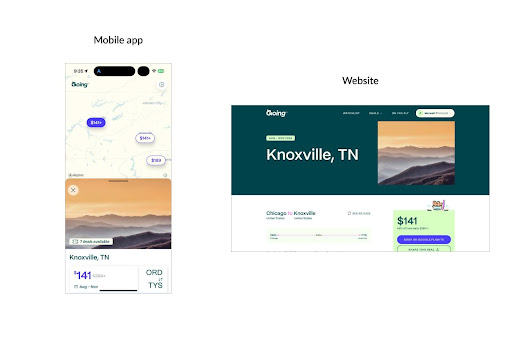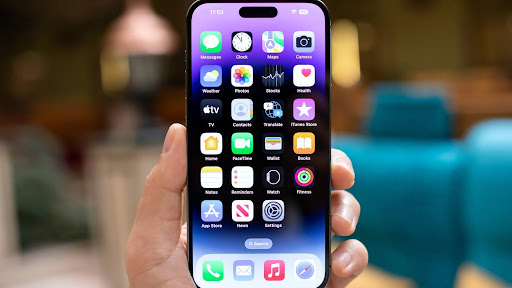Mobile app vs responsive website: What should you choose?
The decision of mobile app vs responsive website is a lot more prevalent today than it has been in the past.
Nearly two-thirds of all web traffic now originates from mobile devices, and most of us are far more attached to our phones and tablets than our desktop and laptop computers.
Major retailers and corporations have capitalized on this trend by releasing their own branded apps that work in conjunction with – or sometimes replace – mobile versions of their websites.

That has some small and medium-sized business owners wondering whether they should have their own mobile apps too.
For that reason, one of the most popular questions we hear these days goes something like this: “Does my business need a dedicated mobile app or responsive website? Would we be better off with both, or maybe neither?”
As you might expect, there isn’t a one-size-fits-all answer to this question. It mostly depends on your goals, capabilities, and budgetary constraints.
However, we can tell you that the answer is never to skip mobile compatibility and website responsiveness.
At least half of your customers are probably using mobile devices as their primary means of researching products and services and reaching out to the businesses they work with.
To leave that money on the table would be a huge mistake.
So now the real task becomes how best to give your mobile customers what they need.
Let’s look at the differences between mobile apps vs responsive websites, and then study the pros and cons of each.
Mobile apps vs responsive websites
When comparing any two business and marketing solutions, it’s important to know exactly what they represent.
What is a mobile app?
A native mobile app is one that you download to your phone or tablet, usually through your operating system’s marketplace (App Store or Google Play.)

You tap your finger on the icon to load it and it will likely have limited features that operate via touchscreen.
In some cases, the content on a mobile app will mirror what would be found on a company’s website. In other cases, the app has major differences, and may even be available offline.
You undoubtedly use a dozen or more of these types of programs every day.
What is a responsive website?
A responsive website is simply a normal set of pages that adapts correctly on a desktop, mobile, or any other proportion.
It may have layouts and programming (like drop-down menus that can be tapped, or click-to-call buttons) that either change for mobile users or allow them to navigate easily on a small screen.

Also, it will have content that is optimized for different resolutions and fast loading over wireless connections.
While apps have to be downloaded from stores and installed in devices, mobile-ready websites can be accessed from any connected computer or device.
In fact, computer users might not even realize they are on mobile-ready websites when using bigger screens and standard browsers. In many ways, the distinction is invisible unless you happen to be on a phone or tablet.
Before we move on, we should note that we are comparing native mobile apps to responsive websites that adapt themselves to different screen sizes and device types.
What about mobile-only?
For a while, building dedicated mobile-only versions of business websites was a popular solution. However, that simply doesn’t make sense for most marketers anymore.
For one thing, it’s much easier (and more cost-effective) to just maintain a single responsive web presence. And for another, virtually anything you could do with a mobile-only website is better accomplished with a native app.
Why would someone choose a mobile app over a responsive website?
Because app development is such a hot topic, and something many of our new and potential clients ask about, let’s begin our comparison with the advantages of launching an app that lives directly on phones and tablets.
Mobile app advantages
- You can include advanced capabilities
- Although you can do quite a bit on the web, it’s fair to say that a native app can have more processing and marketing capabilities.
- The more interactive your software is, the easier it will be for you to build an app that works on a device rather than a browser.
- Additionally, apps can be utilized to send push notifications to users which can’t really be duplicated on mobile-friendly websites.
- Mobile app users represent a captive audience
- When someone downloads your app and opens it up on their phone or tablet, they are working within an ecosystem you have created.
- They aren’t as likely to click away to a competitor’s website or app because they are already engaged with your business.
- The fact that they’ve taken the time to download your software ties them to your company in a somewhat meaningful way.
- Developing your own mobile app can be a strong branding move
- Having a company mobile app can help you build stronger branding.
- Not only are you running an end-around on your competitors, but most of us use apps more habitually than we do websites. Someone who sees your app icon on their phone might interact more frequently with your company than if you simply had a website.
- That’s particularly true if your app includes useful tools, or performs everyday calculations that make their lives or jobs a little bit easier.
- For example, most of us have shopping list apps, fitness tools, and other little pieces of software we use daily. Having your most valuable customers tied to your brand in that way could be great for your bottom line.
Mobile app disadvantages
There are some disadvantages to launching an app that should be mentioned.
- Mobile apps are a huge investment
- The first is that developing an app can be expensive, time-consuming, and platform-dependent.
- So, not only do you have to have separate apps for iPhones and Androids, as an example, but you have to keep both up-to-date as those operating systems change.
- Customer behavior is the deciding factor
- Another big downside is that deciding to develop an app can be relatively easy, but convincing customers to download, install, and use the software is a bigger challenge.
- Thousands upon thousands of apps have been abandoned because buyers didn’t adopt them. You don’t want to make yours a key part of your marketing campaign only to see it fail.
The benefits of opting for a mobile-friendly responsive website
As an alternative to developing and launching a native mobile app, you could work with your web design team to ensure your site is fully compatible with all devices.
There are several advantages to choosing a responsive web design in place of a native app:
Responsive website advantages
- You have a single online marketing hub
- It takes a lot of time, money, and effort to maintain a website and an app that has to work on many different devices and browsers.
- While you can reach both mobile and traditional users with a single web presence, you can’t skip having a website for your company because you have an app. For a lot of business owners and executives, that versatility represents the deciding factor that makes a website more valuable than an app.
- You’ll reach more buyers with your responsive website vs a mobile app
- There are many ways to promote your responsive website, including search engine optimization, pay-per-click ads, social media links, email newsletters, and more.
- Also, mobile users can get to your website at any time. However, the pathway for users to discover and download your mobile app is likely to be much more narrow and more concentrated.
- That means a website will likely attract more views and users than an app.
- A responsive website is easier to launch and upgrade
- While building a mobile app certainly isn’t an impossible project, it does take time, money, and testing. The same could be said of a new website, but the latter is much easier to update and maintain.
- As time goes on, it’s far simpler to just keep a web presence up to date than it is to keep creating new versions of an app that account for bug fixes, new operating system releases, and user requests.
- Your responsive website will last longer than a mobile app
- As a rule of thumb, the average website is going to have a much longer life span than an app.
- That’s because a well-maintained website, running on a content management system like WordPress, can be refreshed regularly and works perfectly on a number of devices and browsers.
- App programming, conversely, may break down over a series of patches and updates.
The bottom line on mobile apps vs. mobile-friendly responsive web design
As we have already pointed out, there isn’t a single right answer or solution to the mobile app vs. responsive website question.
What works for a retailer who wants customers to buy products directly through an app-based shopping cart might not be the same as it would be for a manufacturer or B2B service interested in logistics or lead generation.
For that reason, finding the right answer is largely dependent on a few details.
- Certainly, the type and percentage of a company’s mobile user base needs to factor into their thinking. Is it the case that 90 percent of customers are interacting with the business through a smartphone or just a small handful of buyers? And, what are those mobile users wanting to accomplish with an app or website?
- Similarly, a business owner or executive has to think about their own short and long-term goals.
- What will they be hoping to accomplish in the coming years, and in what ways might the company grow or evolve? How will the web and marketing strategies be adjusted in response?
- And finally, costs have to be a consideration.
Your best next step
Most businesses can do without a mobile app, but only a very small handful could survive – much less thrive and grow – without a modern website design.
So, if the choice has to be made between one or the other because the marketing budget won’t support both, then the choice is normally clear.
With those points made, we can tell you from experience that it’s almost always the case that a small or medium-sized company is better off opting for a responsive web design a mobile app.
That’s particularly true if their current mobile compatibility leaves something to be desired. Not only is it more cost-effective to simply work on one web platform, but there is always room for growth and expansion once mobile usage hits a tipping point.
In other words, you are probably better off making sure your website is optimized for mobile visitors. That’s going to be an easy first step and one that will be likely to show a positive ROI in the very near future.
Later, if you find that customer demand and internal budgets support a bigger effort you can experiment with mobile app ideas while maintaining the gains already in place. It’s a great way to stay forward-thinking without stretching your budget any farther than you have to.
Station8 is a marketing agency located in Tulsa, Okla. They have a history of working with clients that have incredible noble causes™.
Station8’s award-winning services include messaging, advertising, digital marketing and SEO strategies.
Published: November 4, 2019